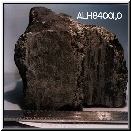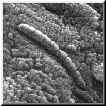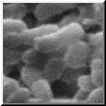|
In this section: Chance
or Design? • The Scientific Method •
Life in a Test Tube? • The
Eye • Irreducible Complexity •
Anything Can Happen? •
Evolution or Selection? • Real Examples of
Evolution • "Do You Feel Lucky?" •
(Abio)Genesis 1:1 • Life
from Comets? • Life on Mars? •
Richard Dawkins • A Brief
History of Slime...
Infallible logic or biased interpretations?
 |
In August 1996, NASA announced the discovery of a meteorite which may have come from
Mars, which may hold evidence of something suggesting the possibility of microscopic
primitive life. That's a bit long for a headline, so the media announced the discovery
as: |
 |
|
|
Was this a reasonable conclusion? Decide for yourself after
considering the support, extracted from NASA's web page.
What NASA said:
|
Questions to ask:
|
| Meteorite ALH84001 is one of twelve meteorites which are thought to be from Mars. All twelve are igneous rocks
crystallized in a way which suggests they formed in a
planetary-sized body. All twelve also show evidence of shock heating, presumably as a result of the impact which ejected them into
space. |
So we really don't even know if the meteorite came from Mars
to begin with or how it got here? |
| About 3.6 billion years ago, the bacteria became fossilized
in the fractures. Gas bubbles trapped in one meteorite, EETA79001, have a composition
which matches the current martian atmosphere, compelling
evidence that this meteorite and by association the others,
including ALH84001, came from Mars. |
So we’re told that evolution on Earth required a
radically different atmosphere from what we see today, but expected to believe in
evolution on Mars based on an atmosphere that hasn’t changed a bit in 3.6 billion
years. Why? And it wasn't even from the same meteorite? |
| Most meteorites formed early in the history of the solar
system, some 4.6 billion years ago. Eleven of the twelve martian meteorites have ages less
than 1.3 billion years, ALH84001 at 4.5 billion years old being the
only exception. |
So this "fossil life" is in the one meteorite that
is as old as the solar system, long before life existed? And the other ones
were used to conduct the atmospheric tests? |
| One (other evidence) is the discovery of abundant
polycyclic
aromatic hydrocarbons (PAHs). These are commonly found on dust
grains and certain types of meteorites in outer space, presumably
formed by non-biological chemical reactions. However, when
micro-organisms die they break down into PAHs as well. The mixture of PAHs found on
ALH84001 is very different from that found on dust grains and other meteorites, suggesting the possibility of a
biological origin." |
So we’re just looking at chemicals commonly found on
meteorites and are willing to proclaim this as life because the mixture is different?
Could there be other factors involved? |
| Finally, electron microscopy has revealed the presence of
tiny "ovoids" which may actually be fossil remnants
of tiny bacteria. If so, they are 100 times smaller than any
bacteria microfossils found on Earth, except for some supposed
"nanofossils" recently discovered in very young terrestrial rocks, a finding
currently not generally accepted as fossil organisms. |
So, if this same "evidence" were found on earth it
would not be accepted as a fossil organism, but we're supposed to believe that is evidence
of a fossil when it’s found on a rock that is supposed to be from Mars. Why? |
It's easy to see why one might think that the ovoid on
the meteorite resembles bacteria from the earth:

Mars "fossil" |

Earth bacteria |
Until you show the pictures to scale:

Mars "fossil" |

Earth's smallest bacteria showing its width to scale,
but only 20% of its length |
'I think it is very unlikely they have remnants of biological
activity.'
William Schopf of UCLA, a leading expert on microfossils
Do hopes and beliefs influence how we interpret data?
|

